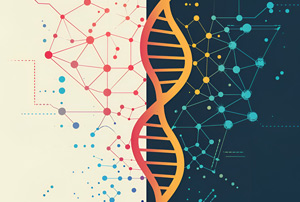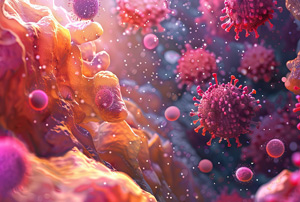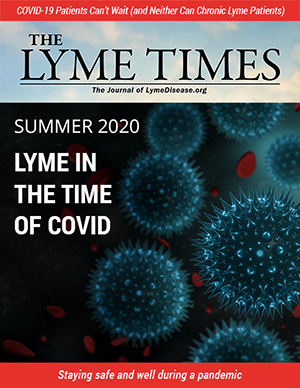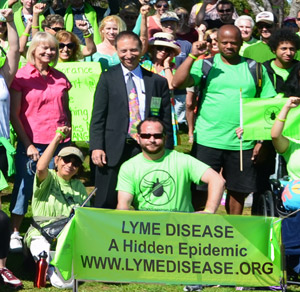Triggers, Symptoms & How to Cope with MCAS With MCAS, the immune system is stuck in high alert mode; more than one trigger can set off a response, and triggers may change over time.
 I f you spend time in online Lyme disease forums, support groups, or other gatherings of Lyme patients, you’ll definitely hear people talk about mast cell activation syndrome (MCAS). The conversation tends to be fraught with frustration — and understandably so.
I f you spend time in online Lyme disease forums, support groups, or other gatherings of Lyme patients, you’ll definitely hear people talk about mast cell activation syndrome (MCAS). The conversation tends to be fraught with frustration — and understandably so.
MCAS might be a factor in people whose mild sensitivities or reactions to food, stress, chemicals, or something else have suddenly accelerated into a list of life-altering, distressing symptoms. Often, these patients struggle significantly as they attempt to identify the hidden triggers making them miserable.
The syndrome is one subclass of disorders that fit into a category known as mast cell activation diseases (MCADs). Historically, the medical community has viewed MCAS as rare, but one study in the Journal of Hematology and Oncology suggests it’s a relatively common problem in patients with chronic health conditions.
“Signs and symptoms associated with mast cell overactivity are not uncommon in people struggling with chronic Lyme disease and similar chronic illnesses such as fibromyalgia,” says Dr. Bill Rawls, Medical Director of RawlsMD and Vital Plan.
“Microbes and other stress factors associated with these conditions disrupt immune system functions and push certain aspects of the immune system, like mast cells, into overdrive.”
So what exactly is MCAS, and more importantly for people with the condition, what can be done about it? Here, we’ll explore this multisystemic syndrome and discuss the various strategies you might find helpful for coping with and overcoming it.
MCAS Explained
Mast cells are small, wandering immune cells that move throughout the various types of connective tissues in your body, including the skin, blood, bone marrow, and lining of the intestinal tract. We all have them, and their primary function is to alert the body when a disturbance has occurred.
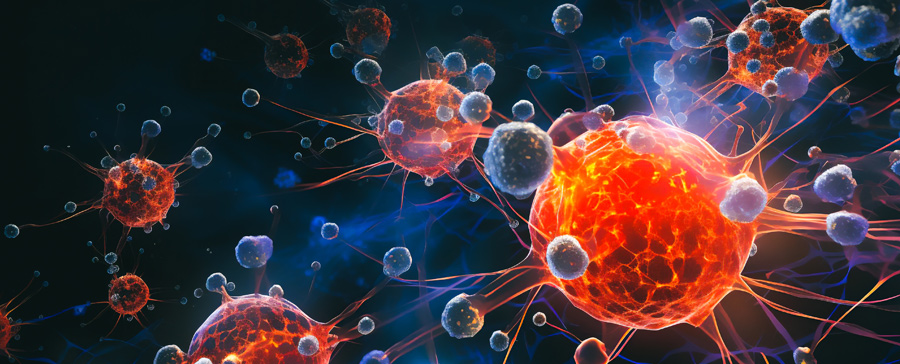
Mast cells help keep infections in check, manage gastrointestinal health, allergens, the invasion of pathogens, the inflammatory process, and more. They contain small sacs, also known as granules, that store potent signaling agents, or chemical mediators, like heparin, histamine, and others. When the cells become aggravated by illness, injury, or an infection, even to a mild degree, they selectively release these mediators, which initiates an inflammatory response in the body.
For instance, mast cells are involved in allergic reactions: They secrete histamine, the chemical that, when produced in excess, causes allergy symptoms like itchy skin, rashes, watery eyes, swelling, and a runny nose. Histamine dilates blood vessels and helps clear the irritant.
In a healthy person, when mast cells are triggered by harmful internal and external circumstances, the cells respond in a productive way — by communicating with other cells that control the body’s physiological and immunological responses, suggests an article in the Journal of Histochemistry and Cytochemistry. For most of these people, short-term use of an over-the-counter antihistamine combined with avoiding the bothersome substance can ease the annoying symptoms.
MCAS can cause widespread, debilitating symptoms
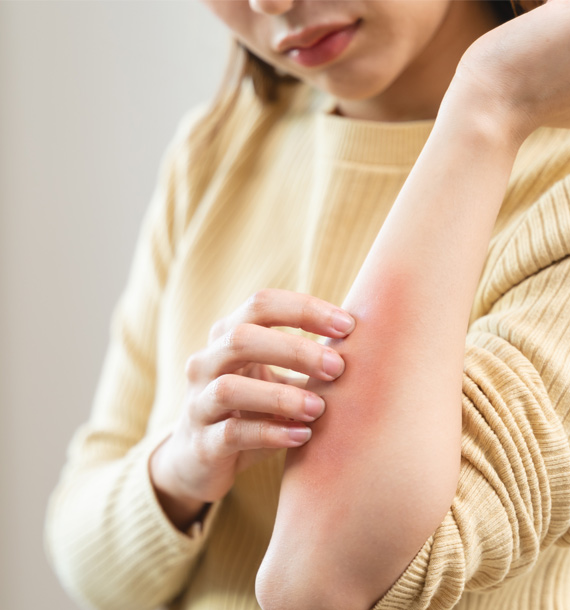 But in people with MCAS, the mast cells demonstrate an exaggerated and disproportionate release of chemical mediators across many systems of the body. The syndrome can cause widespread, debilitating symptoms that pop up suddenly, change from one day to the next, and shift in intensity. They also vary vastly from person to person. For example, one person may experience typical allergy symptoms like itchy skin, rashes, or swelling; another may encounter more food-related challenges, and a third may have every symptom in the book.
But in people with MCAS, the mast cells demonstrate an exaggerated and disproportionate release of chemical mediators across many systems of the body. The syndrome can cause widespread, debilitating symptoms that pop up suddenly, change from one day to the next, and shift in intensity. They also vary vastly from person to person. For example, one person may experience typical allergy symptoms like itchy skin, rashes, or swelling; another may encounter more food-related challenges, and a third may have every symptom in the book.
 Furthermore, Lyme disease and fibromyalgia patients aren’t the only ones prone to mast cell involvement. It can also be found in people with idiopathic anaphylaxis (an anaphylactic reaction where the cause is unknown), interstitial cystitis (IC), and irritable bowel syndrome (IBS) due to the ability of the mast cells to generate chronic inflammation.
Furthermore, Lyme disease and fibromyalgia patients aren’t the only ones prone to mast cell involvement. It can also be found in people with idiopathic anaphylaxis (an anaphylactic reaction where the cause is unknown), interstitial cystitis (IC), and irritable bowel syndrome (IBS) due to the ability of the mast cells to generate chronic inflammation.
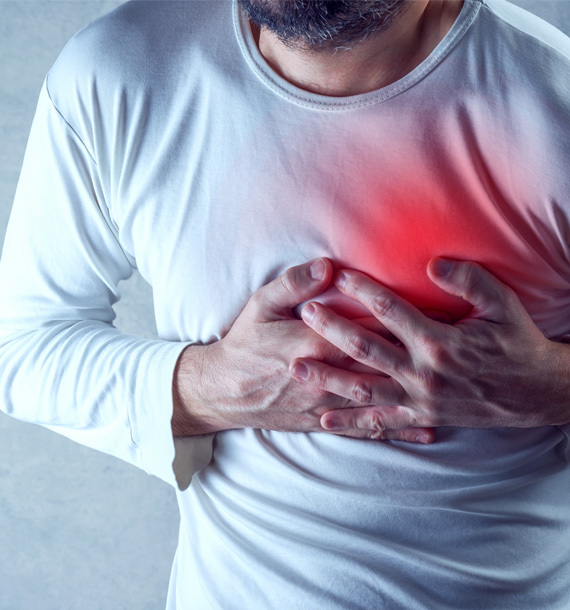 Researchers also speculate there could be a connection between MCAS and people who have postural orthostatic tachycardia syndrome (POTS) and the hereditary condition known as Ehlers-Danlos syndrome (EDS). But because this illness triad has several overlapping symptoms, it’s challenging for experts to determine which symptom is attributed to which disease.
Researchers also speculate there could be a connection between MCAS and people who have postural orthostatic tachycardia syndrome (POTS) and the hereditary condition known as Ehlers-Danlos syndrome (EDS). But because this illness triad has several overlapping symptoms, it’s challenging for experts to determine which symptom is attributed to which disease.
Furthermore, scientists conjecture there may be a link between people diagnosed with MCAS and the severity of acute COVID-19 illness and long COVID symptoms based upon the shared hyperinflammatory cytokine storm. Although this association has yet to be proven, it may provide new insights into treatment options for MCAS and the novel coronavirus if it holds up.
Since many chronic diseases are associated with excessive inflammation, we’re probably just getting started with our understanding of the numerous conditions that may be connected to MCAS.
MCAS Symptoms
MCAS may be a possible diagnosis when people are chronically ill, demonstrate signs and symptoms in multiple systems of the body, and have a primary diagnosis that doesn’t account for a large part of their clinical presentation. In other words, if a person has a number of symptoms that fall outside the scope of their primary chronic illness diagnosis, they could be exhibiting signs of mast cell activation involvement.
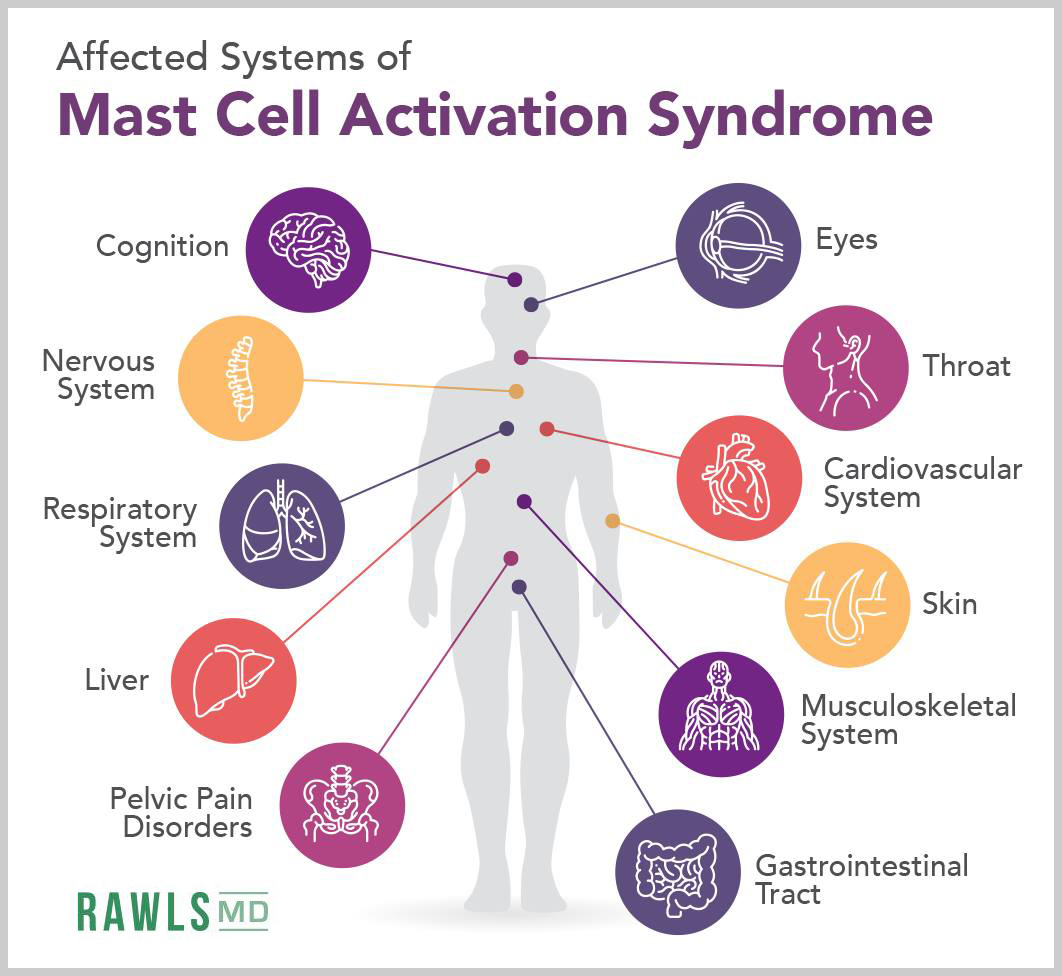
The symptoms of MCAS can affect both children and adults. Occasionally, multiple family members can exhibit signs of the condition, pointing to a possible genetic component.
- Gastrointestinal tract: — abdominal pain, cramping, diarrhea, bloating, nausea, vomiting, difficulty digesting certain foods, food intolerances
- Musculoskeletal system: — muscle and bone pain, migratory arthritis, muscle weakness
- Nervous system: — nerve pain, headache, neuropathy, vertigo, tinnitus, insomnia, depression, anxiety
- Cognition: — difficulty concentrating, reduced attention span, brain fog, trouble with memory
- Pelvic pain disorders: — endometriosis, IC or painful bladder syndrome (PBS), vulvodynia
- Skin: — itching, rashes, hives, inflammation, swelling, spider veins, flushing
- Eyes: — inflammation of the eye or conjunctivitis, trouble focusing eyes, itchy and watery eyes
- Throat: — a burning sensation, ulcers on the tongue or in the mouth
- Respiratory tract: — coughing, wheezing, difficulty breathing, runny or stuffy nose, sneezing, sinus pain or pressure
- Liver: — enlarged spleen, increased bilirubin levels, elevated liver enzymes, high cholesterol
- Cardiovascular system: — rapid heart rate, abnormal blood pressures (either too high or too low), fainting
- Other: — fatigue, lethargy, fevers, anaphylaxis, chemical and environmental sensitivities
That’s a giant list of symptoms! To make matters worse, standard lab tests or imaging may not reveal any abnormalities or clues to the underlying cause that’s driving a hypersensitive mast cell process, making the diagnosis of MCAS all the more challenging to obtain.
MCAS Testing and Diagnosis
The first diagnostic criteria for MCAS came from a group of international physicians in 2011, so the present knowledge about mast cell disorders is still in its infancy. Due to the complexity of the illness and lack of mainstream medical awareness, patients struggling with MCAS may find it difficult to obtain an accurate diagnosis, and they might see many specialists to no avail in the process of searching for relief.
However, more healthcare professionals are slowly becoming aware of the havoc an extreme and prolonged mast cell reaction can have on the body. The Mastocytosis Society, a nonprofit organization with a mission to provide support and resources to patients, contains a Physician Database of medical professionals who may be able to help you.
In many circumstances, a diagnosis of MCAS may be suspected based on a person’s clinical presentation, lab work indicating the presence of histamine or other chemical mediators, response to medications, and the diagnosis or exclusion of overlapping diseases.
Currently, there are three key diagnostic criteria for MCAS:
When discussing your condition with your doctors, it’s crucial that you provide them with a detailed list of your symptoms. People who have MCAS tend to note symptoms that occur in two or more systems of the body at the same time; the symptoms can wax and wane or be chronic, and there’s no known underlying cause for them.
Your physician must be able to document that your symptoms are associated with mast cell activity and may order blood or urine tests to check for an increase in mediators like tryptase (an enzyme that’s present in allergic reactions), histamine, or prostaglandin levels. During a flare-up of MCAS, one or more of these mediators are apt to be elevated.
You may be asked to track your response to medications that interfere with the release of mediators — namely histamine. A favorable response to drug therapy, meaning your symptoms lessen or resolve completely, points to some amount of mast cell activation as the culprit.
If you think you might have MCAS, a multi-faceted treatment approach centered around providing symptom relief, balancing the immune system, and searching for underlying factors will be of significant benefit to you
Underlying Causes and Triggers
To date, no single factor has been decided upon as a cause for MCAS, but researchers believe genetic variants play a role in who’s likely to develop the syndrome. A study in the peer-reviewed online journal, PLoS ONE, showed that 74 percent of people with MCAD had at least one first-degree relative with disorders affecting mast cells, adding further credence to the idea that there’s a genetic component involved with MCAS.
Beyond genetics, immune dysfunction in people with chronic Lyme disease and other chronic illnesses is most likely a piece of the puzzle contributing to an unruly activation of mast cells. But what is the driving force behind the illness?
“Various microbes associated with these illnesses manipulate the immune system and cause it to go haywire,” explains Dr. Rawls.
“Because the spectrum of microbes is different in every person, the types of symptoms are also different. It’s not one microbe, but a disruption of the entire balance of the microbiome that is the most likely culprit.”
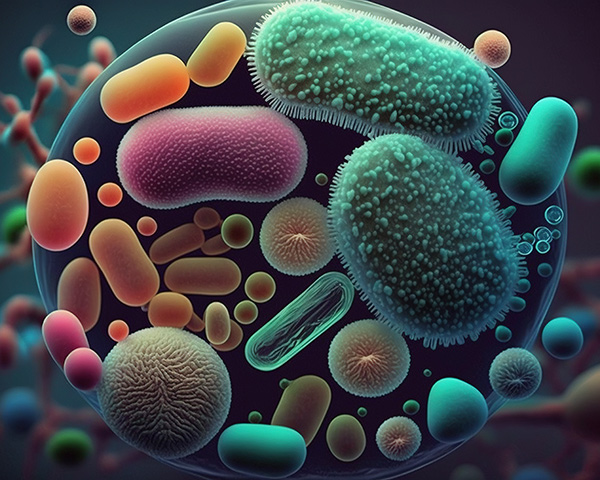 Other pieces of the puzzle are the factors that allow troublemaking microbes deep in tissues of the body to flourish. Dr. Rawls calls them “cellular stress factors,” and they include a poor diet, toxins, stress, lack of movement, and poor sleep. When that microbial burden becomes too great, it tips your microbiome balance in the wrong direction and further disrupts immune function, driving inflammation and initiating symptoms.
Other pieces of the puzzle are the factors that allow troublemaking microbes deep in tissues of the body to flourish. Dr. Rawls calls them “cellular stress factors,” and they include a poor diet, toxins, stress, lack of movement, and poor sleep. When that microbial burden becomes too great, it tips your microbiome balance in the wrong direction and further disrupts immune function, driving inflammation and initiating symptoms.
With MCAS, the immune system is stuck in high alert mode, so it shouldn’t be surprising that more than one trigger can set off a response, and triggers may change over time.
- Exposure to heat, cold, or abrupt changes in temperature
- Mental or physical stress
- Environmental factors like pollution, mold, pollen, and other toxins or allergens
- Food sensitivities
- Food and drinks containing bioactive amines, such as wine, beer, and fermented foods
- Foods high in naturally occurring histamines, including cured meats, aged cheese, and beans
- Over-the-counter and prescription medications like ibuprofen, opiates, antibiotics, local anesthetics, and contrast dyes used for imaging
- Exercise
- Scented products, whether natural or synthetic
- Exposure to chemicals
- Venomous bites like snakes, bees, wasps, spiders, and jellyfish
- Insect bites, including mosquitoes, flies, ants, and fleas
- Infections, whether bacterial, viral, fungal, or a combination of the three
- Hormonal fluctuations
- Irritants to the skin
- Sun exposure
How to Cope with Mast Cell Activation Syndrome
 “As with any illness, easing symptoms is important — H1 blockers, like antihistamines Benadryl and Claritin, and H2 blockers, like Pepcid and Tagamet, can provide relief in the short term,” says Dr. Rawls. Other types of medications that can ease symptoms include aspirin, mast cell stabilizers, leukotriene inhibitors, and monoclonal antibodies. Additionally, a clinical trial using the drug masitinib is set to wrap up in December 2022. Masitinib is in the category of drugs called tyrosine kinase inhibitors, and it regulates certain aspects of mast cell activity.
“As with any illness, easing symptoms is important — H1 blockers, like antihistamines Benadryl and Claritin, and H2 blockers, like Pepcid and Tagamet, can provide relief in the short term,” says Dr. Rawls. Other types of medications that can ease symptoms include aspirin, mast cell stabilizers, leukotriene inhibitors, and monoclonal antibodies. Additionally, a clinical trial using the drug masitinib is set to wrap up in December 2022. Masitinib is in the category of drugs called tyrosine kinase inhibitors, and it regulates certain aspects of mast cell activity.
However, treating symptoms alone doesn’t always produce a satisfactory solution. The reason: Over time, you can build up a tolerance to these drugs, requiring more potent medications like corticosteroids and immune blockers, which can lead to a whole host of undesirable side effects.
“To treat the problem, you have to address the underlying causes,” says Dr. Rawls.

Of the utmost importance is avoiding triggers that spark a flare-up of MCAS. Keep the list of common triggers handy and add any new ones you discover to your list. Implementing an elimination diet and keeping a daily log of your foods, activities, medications, and supplements, as well as the timing and nature of any symptoms you experience, is an incredibly useful way to identify things that could be problematic for you.
 Keep tabs on your stress levels, too. Chronic stress is another factor that sends the immune system into high gear; herbs can be very beneficial here. Dr. Rawls recommends CBD (cannabidiol) from hemp, which has an overall calming and balancing effect on both the nervous system and the immune system. Other herbs such as motherwort, bacopa, and passionflower can also help bring about a sense of calm and minimize symptoms, as can learning and practicing relaxation techniques such as qigong, meditation, and yoga.
Keep tabs on your stress levels, too. Chronic stress is another factor that sends the immune system into high gear; herbs can be very beneficial here. Dr. Rawls recommends CBD (cannabidiol) from hemp, which has an overall calming and balancing effect on both the nervous system and the immune system. Other herbs such as motherwort, bacopa, and passionflower can also help bring about a sense of calm and minimize symptoms, as can learning and practicing relaxation techniques such as qigong, meditation, and yoga.
Additionally, environmental toxins in food, beverages, and the air we breathe can aggravate immune hypersensitivity or trigger reactions. Ways to curtail toxins include eating organic foods, filtering your water and air, and looking for sources of hidden toxins in your environment, especially mold, and cleaning them up. Furthermore, increasing your level of physical activity as your body allows enhances the body’s natural detoxification abilities.
Herbal therapy is an effective way to manage the microbial load in the body without disrupting the normal flora in the gut microbiome, which is critical to digestive health.
All herbs have some antimicrobial properties; below are a few of the more powerful ones Dr. Rawls relies on most.
- Cat’s claw
- Garlic
- Andrographis
- Berberine
- Japanese knotweed
People with MCAS may also benefit from herbs that assist the body with reducing elevated histamine levels. Natural antihistamines like quercetin, bromelain, and stinging nettle can be helpful. Some patients also report relief by supplementing with diamine oxidase (DAO), a key enzyme responsible for the body’s ability to metabolize and break down histamine.

A word of caution when starting herbs: People with MCAS can react to herbal therapies, too. To avoid overtaxing your body, ease into an herbal protocol. Instead of taking several supplements at one time, choose one herb and see how your body tolerates it.
Through a bit of trial and error, you may find that you can only take an herb a couple of times a week instead of every day. Ultimately, tolerance to herbal therapies will vary from person to person; a crucial point to remember is to always start low and go slow with your dosing.
The Bottom Line
From time to time, you may experience a flare-up of MCAS, where you’re unable to pinpoint a cause, sending you into panic mode.
- Use medications as needed for more immediate symptom relief.
- Arrange your schedule so that you have adequate time to rest and sleep.
- Take a look at your log from the last few days to see if you can spot the potential offender.
- Make adjustments to your diet and daily activities as needed to reduce the risk of further flare-ups.
Sometimes, contending with a chronic illness of any kind can make you feel powerless. “Of course, genetics and aging play a part in this illness, but remember that you do have a measure of control over a few things. You can change what you eat. You can manage toxins. You can get out and move.” Ultimately, do what you can to feel better now while also addressing long-term recovery.
At present, there is no one-size-fits-all approach to beating or treating MCAS, but by decreasing your microbial burden, monitoring your intake of high-histamine foods, making healthy lifestyle choices, managing stress, and cultivating good sleep, you can do a lot to stabilize mast cells and balance and nurture your immune system.
Editor’s note: Any medical information included is based on a personal experience. For questions or concerns regarding health, please consult a doctor or medical professional.






